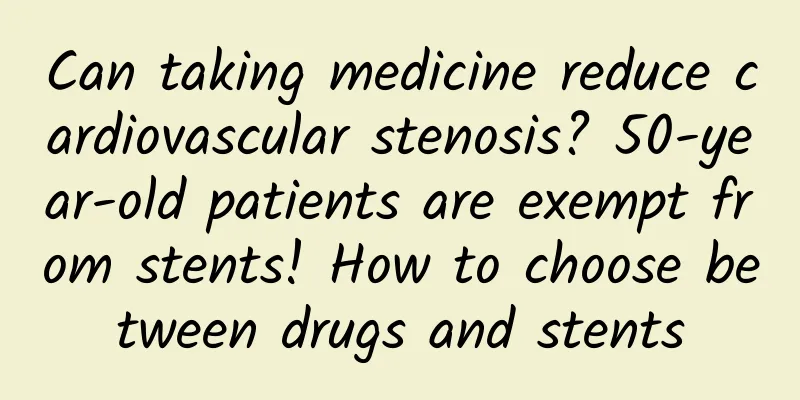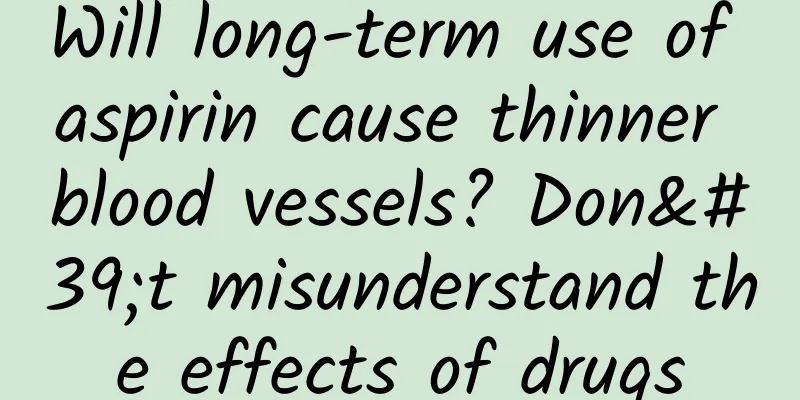Can taking medicine reduce cardiovascular stenosis? 50-year-old patients are exempt from stents! How to choose between drugs and stents

|
In the middle of the night, an ambulance brought in an old man who had suffered a sudden myocardial infarction. The patient was in his 50s and suddenly felt chest tightness after dinner. He thought he would get better if he just endured it, but the symptoms became increasingly severe. His family quickly called 120 and came to the hospital. An emergency electrocardiogram showed a large area of myocardial ischemia and elevated troponin. The doctor considered acute myocardial infarction. It was recommended to perform cardiac angiography immediately! The angiography results showed that one main blood vessel was blocked and the other was 80% narrowed! Therefore, a stent was implanted to open the blocked blood vessel. The patient's symptoms were significantly relieved. The doctor decided to first use drug treatment on the other narrowed blood vessel and implant a stent at an appropriate time when the condition stabilized . After one week of intensive drug treatment, the patient came back to the hospital for stent implantation. But surprisingly, the original 80% stenosis was reduced to 75% . The doctor believed that this was due to the intensive medication. At this time, the stenosis was at a "critical lesion", so the patient could be given a chance to take the medicine first. If there were no symptoms, the implantation of a new stent could be postponed . The patient also followed the doctor's advice, actively took medication after discharge, strengthened blood lipid control and quit smoking, and his condition has been stable nearly a year after discharge. Question 1: Can taking medicine really reduce cardiovascular stenosis? Coronary atherosclerotic plaques are irreversible degenerative lesions of arterial endothelial cells. Drug treatment can only delay the progression of stenosis but cannot eliminate it. The reason why the patient's angiography results seem to be alleviated is that the unstable plaque has become a stable plaque. Unstable plaques rupture after swallowing a large amount of lipid substances, which then triggers a series of inflammatory reactions to form thrombi, causing the stenosis to worsen. Antiplatelet and statin drugs can inhibit platelet aggregation, reduce inflammatory reactions and blood lipid levels, thereby stabilizing plaques and effectively curbing the progression of stenosis. However, this only compacts the volume of the atherosclerotic plaque, but does not eliminate it fundamentally. In layman's terms, the plaque with thin skin and large filling becomes a plaque with thick skin and small filling. Question 2: How to choose between drugs and stents? Patients with different conditions cannot be generalized. 1. For patients with acute myocardial infarction, stent therapy is the most effective way to quickly open blocked blood vessels and restore myocardial blood supply, reducing the mortality rate from as high as 40% in the past to less than 5%; 2. For patients with recurrent angina pectoris that cannot be effectively controlled by drugs, stent treatment can quickly improve symptoms, improve quality of life, and reduce the risk of further aggravation of stenosis and myocardial infarction; 3. For patients whose angiography shows cardiovascular stenosis of less than 75%, drug treatment can be used; when the stenosis is at a critical lesion of 75%-80%, if drug treatment can effectively control the symptoms of angina pectoris, drug treatment can be used first and stent implantation can be postponed. I am Dr. Zhang from the Department of Cardiology. If you like my popular science articles, please like them! You can also share them with friends in need! Follow me to see more health knowledge about heart disease! |
>>: Will wearing glasses for a long time really cause eye deformation?
Recommend
Be careful! If you don’t do this in spring, you will age quickly!
As the temperature rises, spring is finally here....
Why do people develop tumors?
Tumors are abnormal new growths formed by various...
Is rice a carbohydrate? What are carbohydrates?
Carbohydrates are the main components of the stru...
22 years old and no menstruation for four months
Menstruation (also known as menstruation, also kn...
What causes ectopic pregnancy?
There are many types of ectopic pregnancy, among ...
How can menstruation be considered completely clean?
Menstruation is a normal physiological period tha...
What causes vulvar itching and pain?
Many women always encounter some unspeakable gyne...
What to do if you have insomnia after giving birth
Pregnant women are already very weak after giving...
How to treat hard swelling and pain in the vulva
When there are lumps and swelling and pain on the...
What are the best treatments for depression?
The pace of life in big cities is relatively fast...
Can children floss?
Whenever children have dental caries, swollen gum...
Benefits of squats for women
In life, there are certain benefits to doing squa...
Treatment of gastrointestinal cold in pregnant women
In daily life, many pregnant women have no appeti...









